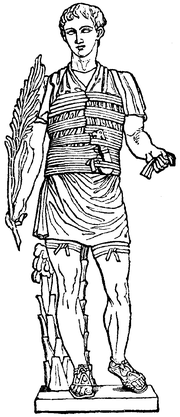.gif)
Auriga (slave)
Encyclopedia

Rome
Rome is the capital of Italy and the country's largest and most populated city and comune, with over 2.7 million residents in . The city is located in the central-western portion of the Italian Peninsula, on the Tiber River within the Lazio region of Italy.Rome's history spans two and a half...
, the Auriga was a slave
Slavery
Slavery is a system under which people are treated as property to be bought and sold, and are forced to work. Slaves can be held against their will from the time of their capture, purchase or birth, and deprived of the right to leave, to refuse to work, or to demand compensation...
whose duty was to drive a biga
Chariot
The chariot is a type of horse carriage used in both peace and war as the chief vehicle of many ancient peoples. Ox carts, proto-chariots, were built by the Proto-Indo-Europeans and also built in Mesopotamia as early as 3000 BC. The original horse chariot was a fast, light, open, two wheeled...
, the light vehicle powered by two horses, to transport some important Romans, mainly Duces (military commanders); it was then a sort of chauffeur for important men, and was carefully selected among trustworthy slaves only.
It has been supposed also that this name was given to the slave that, during Roman Triumph
Roman triumph
The Roman triumph was a civil ceremony and religious rite of ancient Rome, held to publicly celebrate and sanctify the military achievement of an army commander who had won great military successes, or originally and traditionally, one who had successfully completed a foreign war. In Republican...
s, held a laurus crown over the head of the Dux, standing at his backs, but continuously whispering in his ears Memento homo (remember you are (only) a man), in order to avoid that the excess of celebration could lead the celebrated commander to lose his sense of proportions.
The term became common in latter times, indicating any biga driver.

